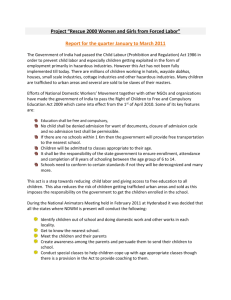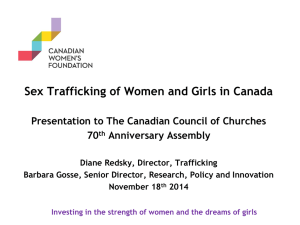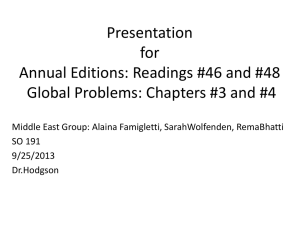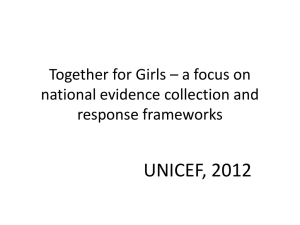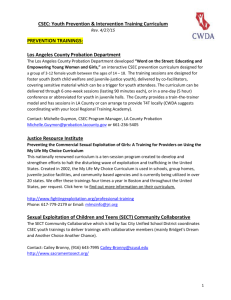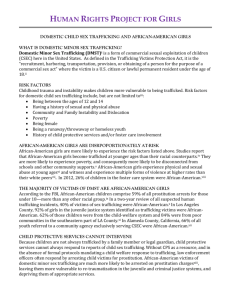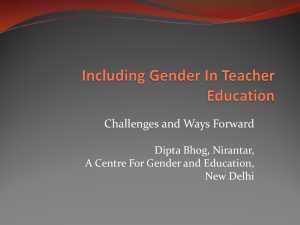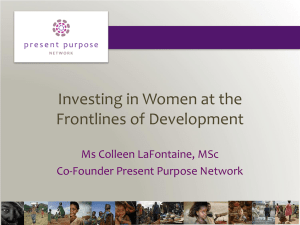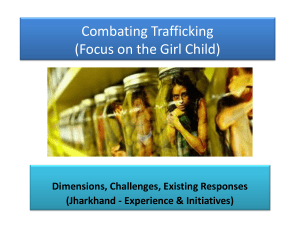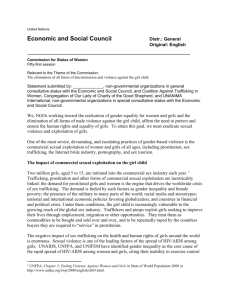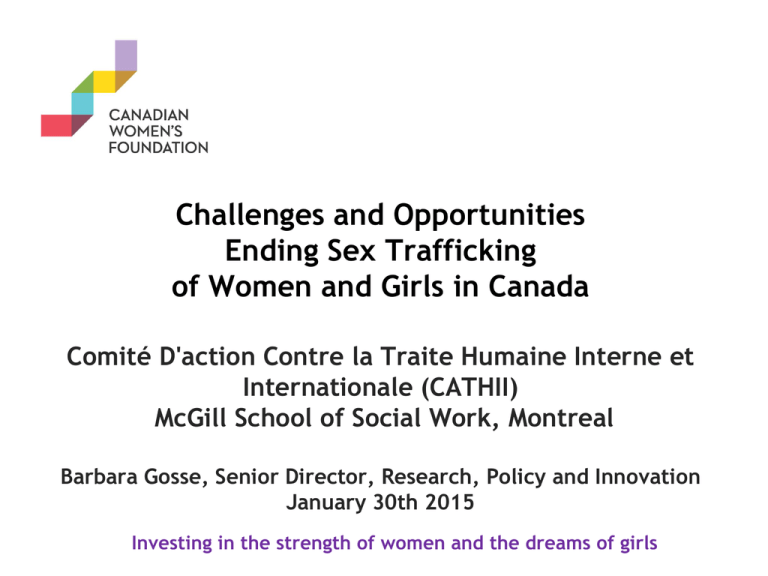
Challenges and Opportunities
Ending Sex Trafficking
of Women and Girls in Canada
Comité D'action Contre la Traite Humaine Interne et
Internationale (CATHII)
McGill School of Social Work, Montreal
Barbara Gosse, Senior Director, Research, Policy and Innovation
January 30th 2015
Investing in the strength of women and the dreams of girls
Maroussia’s Story
Video of Maroussia’s Story:
https://www.youtube.com/watch?v=xiPiT1D3ddk
2
Definition of Human Trafficking
Recruiting, transporting, transferring, harbouring, or
receiving women and girls by:
Deception, fraud, coercion, abuse of power or
Giving or receiving payments or benefits or
Threatening or using force or abduction
For the purpose of:
Sexual exploitation or forced labour or
Servitude or practices similar to slavery or
Slavery
3
3 Elements: The ACT / MEANS / Purpose of Exploitation
Sex Trafficking in Canada
Who is being trafficked?
Domestic: Women and girls are Canadian citizens
International: Women and girls from other countries
Sex trafficking criminals: Two distinct groups that
operate under the supply and demand principles:
Business: Pimps or Managers
Consumer: Johns or “the demand”
4
How does this happen?
Recruited and lured:
Very organized, methodical and targeted
Most often targeted to children and teens
Controlled:
The Goal for control is to: keep her small so she is
powerless, invisible and alone
Trauma bonded with Trafficker
Escape/rescue:
Help of others, kicked out, self
Suicide, missing or murdered
5
Trafficking is Violence Against Women
Deeply gendered practice:
most of the people trafficked are girls/young women
and most of the people who benefit or profit from
their sexual exploitation are men
View in context of violence against women and girls:
domestic violence – violence against women
sexual assault
hyper-sexualization of girls
the normalization of pimp and rape cultures
the growth of child luring and child pornography
6
Canadian Women’s Foundation Responds…
Since 2011 we have……
National Task Force: January 2013–May 2014, 24 Experts
Site Visits: 8-cities across Canada
Consultations: over 260 organizations and 160 Survivors
National Roundtables with Survivors and Service Providers
National on-line survey
National Angus Reid public opinion poll
Commissioned Research / 20 Nat. and Int. Experts
Grant Making: $800,000+
5-year strategy - October 2014
7
What we learned:
The biggest risk factor to sex trafficking is being a girl
The most common recruitment age is 13
Traffickers financially gain $280,800 from trafficking
one woman or girl per year in Canada
Girls and women who are bought and sold from inside
Canada are most often marginalized young girls and
women (Aboriginal, racialized, immigrant and abuse
survivors)
8
What we learned:
Root causes: Gender inequality and violence against
women, poverty, emergence of organized crime/gang
involvement and networks and Racism / Sexism /
Classism
Survivors told us that the systems they interacted the
most while being trafficked as a child were: 1. School
2. Child Welfare 3. Community Organizations
Survivor-led initiatives are essential – including
services, public awareness and advocacy
9
National Task Force concluded…..
“True equality for women and girls will not be
achieved until all forms of violence, including
sexual exploitation and sex trafficking are
eradicated. This will require a broad perspective
and action taken in all sectors and in a wide rate
of policy areas. The results will reflect a
stronger nation whose political, social and
economic inequalities are minimized and where
human rights and the possibility for everyone to
succeed to their greatest potential is achieved.”
10
National Anti-Trafficking Strategy
11
The greatest needs…..
Prevention:
Programs for at risk girls, vulnerable migrants,
runaways, girls in foster care, or girls living in
resource sector communities
Prevention programs for teens, including internet
safety
Targeted public awareness campaigns – social media
Regulation /Monitoring of massage parlours, strip
clubs and escort agencies as well as outreach
strategies
Strategies to address demand
12
The greatest needs…..
First response:
24/7 first response services: policing, medical
community assistance
Relocation if requested
Safe Houses and Detox Beds
Legal assistance/Interpreter services, victim services
Service coordination and inter-service/departmental
collaboration is key
13
The greatest needs….
Rebuilding lives:
Peer Support Groups
Trauma-informed counselling and healing programs
Access to educational upgrading, meaningful
employment, and permanent housing
Victim witness and pre-trial support
Revocation of criminal records
14
The greatest needs….
System change:
Data collection tools, aggregate reporting and analysis
Integrated federal, provincial and municipal strategies
– coordinated between and across sectors
Business sector prevention initiatives
Specialized training and capacity building across
sectors
Vicarious training for staff working in the field
15
5-year Anti-Trafficking Strategy
Heartbreaking to Groundbreaking:
1.Grants
2.Promoting Collective Action
3.Sharing knowledge/expertise = system change
http://canadianwomensfoundation.uberflip.com/i/395419
16
Resources
1. “No More” Ending Sex Trafficking in Canada – Report
of the National Task Force on Sex Trafficking of
Women and Girls in Canada
2. Roundtable reports: Survivors and Front Line Service
Providers
3. Commissioned research on incidence, legal, justice
and policy, Indigenous Women and Girls in Trafficking
4. Infographics, fact sheets, How You Can Help!
http://www.canadianwomen.org/reports/trafficking
17
In their voices……
“…..just try hard not to give up on us like everyone else
in the world has.”
Thank you!
Task Force on Trafficking of Women and Girls in Canada
Canadian Women's Foundation
133 Richmond St. W Suite 504, Toronto ON, M5H 2L3
bgosse@canadianwomen.org 647-776-7980
18

